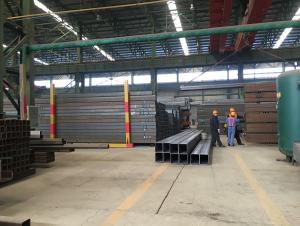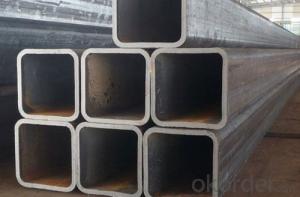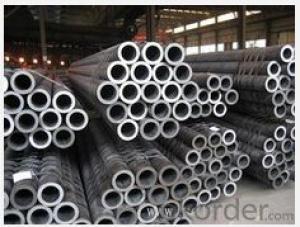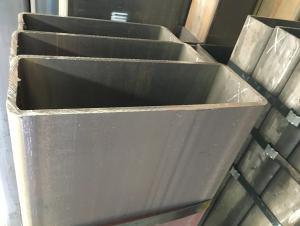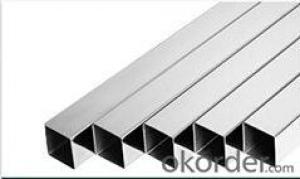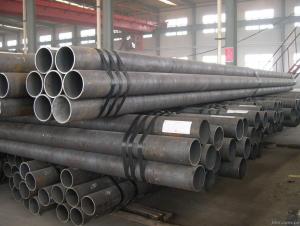Thin walled square tube rectangular tube for furniture
- Loading Port:
- Tianjin
- Payment Terms:
- TT or LC
- Min Order Qty:
- 16 m.t.
- Supply Capability:
- 16000 m.t./month
OKorder Service Pledge
OKorder Financial Service
You Might Also Like
1、Structure of Thin walled square tube rectangular tube for furniture:
Square tube, square tube is a kind of call and rectangular tube, is equal and not equal to the length of steel pipe. Is the strip through the process of processing roll system. In general is the strip through the demolition of the package, flat, curly, welded to form a circular tube, and then rolled into a square tube and then cut into a square tube and then cut into the required length.
2、Main Features of Thin walled square tube rectangular tube for furniture:
• High manufacturing accuracy
• High strength
• Small inertia resistance
• Strong heat dissipation ability
• Good visual effect
• Reasonable price
3、 Thin walled square tube rectangular tube for furniture Specification:
Standard | GB, DIN, ASTM |
Grade | 10#-45#, 16Mn 10#, 20#, 45#, 16Mn |
Thickness | 1.5 - 25 mm |
Section Shape | Square and rectangular |
Outer Diameter | 20*20 mm-------400*400mm 20*30mm*300*500mm |
Place of Origin | Tianjin, China (Mainland) |
Length | 3-12M |
Outer Diameter | 20*20 mm-------400*400mm 20*30mm*300*500mm |
Grade | 235B 345B |
Standard | ASME, ASTM |
1) Material:(ASTM A 106/A53 GRB.API5LGRB,GB,235B,345B
2) Specification range:OD: 20*30mm----300*500mm 20*20 mm---400*400mm ,WT: 1.5 - 25 mm ,length:3-12m or according to the requirement of clients.
3) Excutive standards:GB,ASME API5L.ASTM A 106/A53,Despite of the above
4) Surface:black lacquered,varnish coating or galvanized.
5) Ends:Beveled or square cut ,painted.
6) Packing:bundles wrapped with strong steel strip,seaworthy packing.
4、Packaging & Delivery
Packaging Details: | seaworthy package,bundles wrapped with strong steel strip |
Delivery Detail: | 15-30days after received 30%TT |
5、FAQ of Thin walled square tube rectangular tube for furniture:
①How is the quality of your products?
Our products are manufactured strictly according to national and internaional standard, and we take a test
on every pipe before delivered out. If you want see our quality certifications and all kinds of testing report, please just ask us for it.
Guaranteed: If products’ quality don’t accord to discription as we give or the promise before you place order, we promise 100% refund.
②How about price?
Yes, we are factory and be able to give you lowest price below market one, and we have a policy that “ for saving time and absolutely honest business attitude, we quote as lowest as possible for any customer, and discount can be given according to quantity”,if you like bargain and factory price is not low enough as you think, just don’t waste your time.Please trust the quotation we would give you, it is professional one.
③Why should you chose us?
Chose happens because of quality, then price, We can give you both.Additionally, we can also offer professional products inquiry, products knowledge train(for agents), smooth goods delivery, exellent customer solution proposals.Our service formula: good quality+good price+good service=customer’s trust
SGS test is available, customer inspection before shipping is welcome, third party inspection is no problem.
6、 Thin walled square tube rectangular tube for furniture Images:
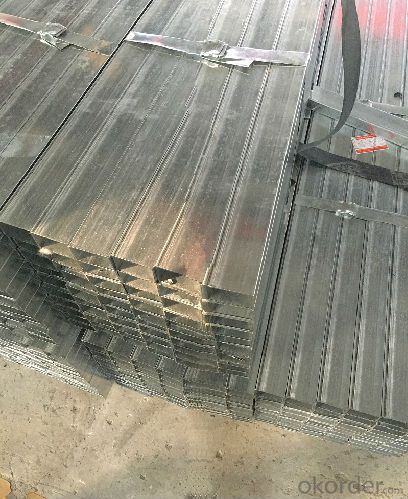
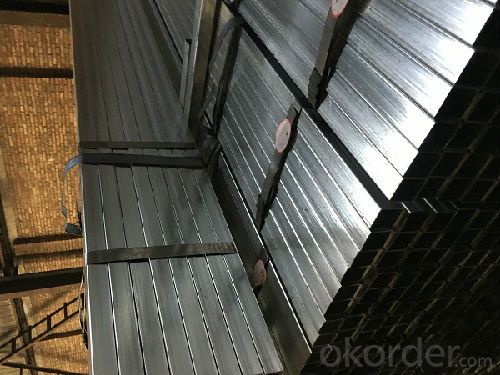
- Q: How are steel pipes used in the infrastructure development?
- Steel pipes are widely used in infrastructure development for various purposes. They are commonly used for transporting water, oil, and gas, as well as for drainage systems and sewage networks. Steel pipes are also used in the construction of bridges, buildings, and highways, providing structural support and stability. Additionally, steel pipes are utilized in underground utilities, such as telecommunications and electrical systems. Their durability, strength, and resistance to corrosion make steel pipes a crucial component in infrastructure development.
- Q: How do you prevent freezing in steel pipes during cold weather?
- One effective way to prevent freezing in steel pipes during cold weather is to insulate the pipes. This can be done by applying foam insulation sleeves or wraps around the pipes. Additionally, ensuring that the pipes are properly sealed and any gaps or cracks are sealed can help prevent cold air from reaching the pipes. It is also important to keep the pipes warm by maintaining a consistent temperature in the surrounding area. This can be achieved by using a space heater or by allowing warm air to circulate around the pipes.
- Q: How are steel pipes coated for protection against external elements?
- Steel pipes can be coated for protection against external elements through a process called corrosion protection coating. This typically involves applying a layer of protective coating, such as epoxy or polyethylene, onto the surface of the steel pipes. The coating acts as a barrier, preventing moisture, chemicals, and other external elements from coming into direct contact with the steel, thus reducing the risk of corrosion and extending the lifespan of the pipes.
- Q: Are steel pipes suitable for use in coastal areas?
- Yes, steel pipes are suitable for use in coastal areas. Steel is highly durable and resistant to corrosion, making it an ideal choice for withstanding the harsh conditions typically found in coastal environments, such as saltwater, high humidity, and strong winds. Additionally, steel pipes offer excellent strength and stability, ensuring their longevity and reliability in coastal applications.
- Q: How are steel pipes used in the manufacturing of machinery and equipment?
- Steel pipes are widely used in the manufacturing of machinery and equipment due to their numerous beneficial properties. These pipes are primarily used for conveying various materials, fluids, and gases within the machinery, providing a safe and efficient means of transportation. One of the key uses of steel pipes in machinery manufacturing is in the process of hydraulic and pneumatic systems. Hydraulic systems rely on steel pipes to transmit power and control fluid flow, while pneumatic systems use these pipes to convey compressed air to power various components. The strength and durability of steel pipes ensure that they can withstand the high pressure and forces exerted by these systems, making them a reliable choice for such applications. Additionally, steel pipes are used in the construction of machinery frames and structures. Their high tensile strength and resistance to corrosion make them ideal for providing structural support and stability to heavy machinery. These pipes can be easily welded, bent, and fabricated into various shapes, allowing for flexibility in design and enabling the creation of complex machinery structures. Furthermore, steel pipes play a vital role in the transportation of raw materials and finished products within the manufacturing process. They are commonly used as conduits for the movement of liquids, gases, and granular materials, facilitating the smooth operation of machinery and equipment. Steel pipes are particularly suitable for handling abrasive and corrosive materials, as their robust construction ensures minimal wear and tear over time. In summary, steel pipes are extensively used in the manufacturing of machinery and equipment due to their strength, durability, and versatility. Whether it is for hydraulic systems, structural support, or material transportation, steel pipes are an integral component that contributes to the efficiency and reliability of machinery in various industries.
- Q: What is the role of steel pipes in HVAC systems?
- Steel pipes are crucial components in HVAC systems as they are used to transport hot and cold water throughout the system. They provide a durable and reliable means of distributing heat or cooling energy to various parts of a building. Steel pipes are known for their high strength and resistance to corrosion, making them an ideal choice for HVAC applications.
- Q: What are the different types of steel pipe fittings for gas pipelines?
- There are several types of steel pipe fittings commonly used for gas pipelines, including elbows, tees, reducers, flanges, and couplings. Elbows are used to change the direction of the pipeline, while tees are used to create branch connections. Reducers are used to connect pipes of different sizes, and flanges are used for connecting pipes with valves or other equipment. Couplings are used to join two pipes together.
- Q: How are steel pipes used in the telecommunications infrastructure industry?
- Steel pipes are commonly used in the telecommunications infrastructure industry as conduits for fiber optic cables. These pipes provide protection and support for the cables, ensuring efficient and reliable communication networks.
- Q: How are steel pipes used in the food and beverage industry?
- Steel pipes are commonly used in the food and beverage industry for various purposes such as transporting liquids, gases, and solids, as well as for structural support. These pipes are highly durable, corrosion-resistant, and can withstand extreme temperatures, making them ideal for handling food and beverage materials safely and hygienically. They are used in applications like conveying water, oils, and gases, as well as in food processing equipment, brewing systems, and dairy processing plants. Additionally, steel pipes are also utilized for storage tanks, piping systems, and infrastructure in the food and beverage industry.
- Q: Can steel pipes be used for oil transportation?
- Indeed, steel pipes find application in the transportation of oil. In the oil and gas industry, steel pipes are widely utilized to transport crude oil, petroleum products, and natural gas. The reason behind their popularity lies in their robustness, endurance, and resistance to corrosion. Steel pipes possess the capability to endure high-pressure conditions, making them suitable for both onshore and offshore oil transportation. Moreover, by welding steel pipes together, extensive pipelines can be constructed, thereby providing a cost-efficient method to transport oil across long distances. In conclusion, steel pipes serve as a dependable and effective option for oil transportation.
Send your message to us
Thin walled square tube rectangular tube for furniture
- Loading Port:
- Tianjin
- Payment Terms:
- TT or LC
- Min Order Qty:
- 16 m.t.
- Supply Capability:
- 16000 m.t./month
OKorder Service Pledge
OKorder Financial Service
Similar products
Hot products
Hot Searches
Related keywords
